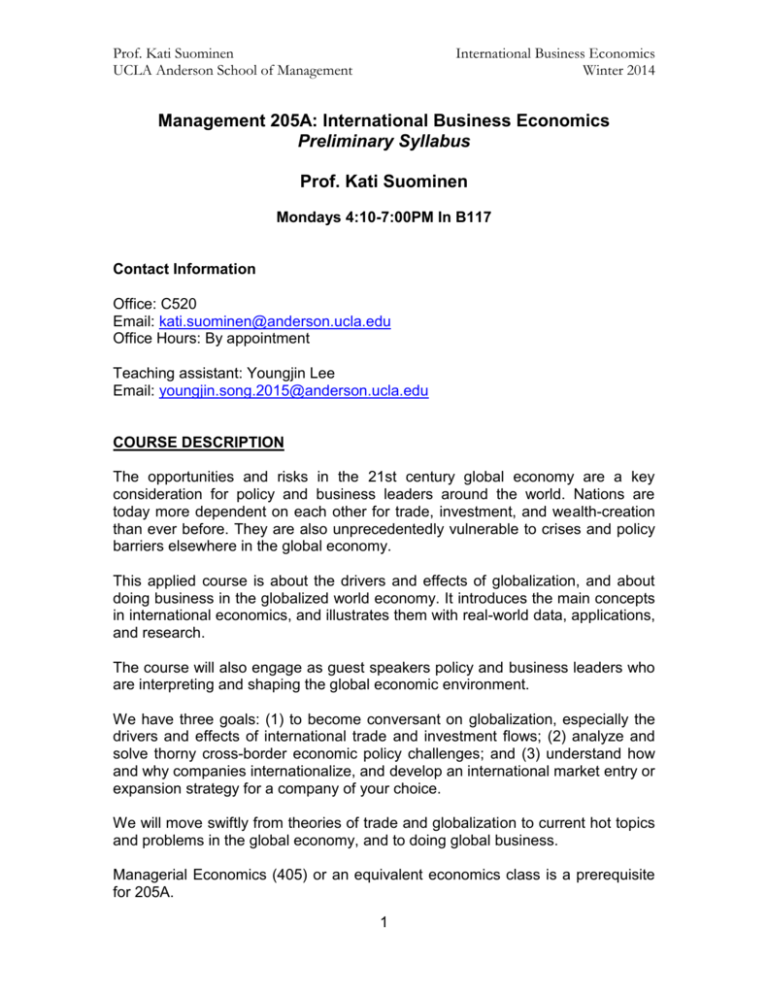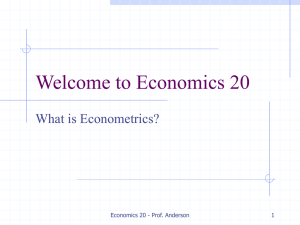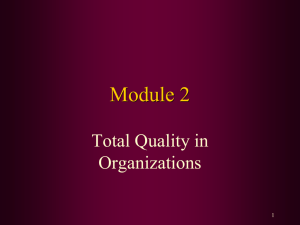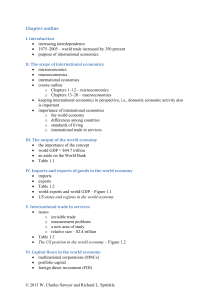The Global Economy (MNGM 406)
advertisement

Prof. Kati Suominen UCLA Anderson School of Management International Business Economics Winter 2014 Management 205A: International Business Economics Preliminary Syllabus Prof. Kati Suominen Mondays 4:10-7:00PM In B117 Contact Information Office: C520 Email: kati.suominen@anderson.ucla.edu Office Hours: By appointment Teaching assistant: Youngjin Lee Email: youngjin.song.2015@anderson.ucla.edu COURSE DESCRIPTION The opportunities and risks in the 21st century global economy are a key consideration for policy and business leaders around the world. Nations are today more dependent on each other for trade, investment, and wealth-creation than ever before. They are also unprecedentedly vulnerable to crises and policy barriers elsewhere in the global economy. This applied course is about the drivers and effects of globalization, and about doing business in the globalized world economy. It introduces the main concepts in international economics, and illustrates them with real-world data, applications, and research. The course will also engage as guest speakers policy and business leaders who are interpreting and shaping the global economic environment. We have three goals: (1) to become conversant on globalization, especially the drivers and effects of international trade and investment flows; (2) analyze and solve thorny cross-border economic policy challenges; and (3) understand how and why companies internationalize, and develop an international market entry or expansion strategy for a company of your choice. We will move swiftly from theories of trade and globalization to current hot topics and problems in the global economy, and to doing global business. Managerial Economics (405) or an equivalent economics class is a prerequisite for 205A. 1 Prof. Kati Suominen UCLA Anderson School of Management International Business Economics Winter 2014 ORGANIZATION Readings: Textbook. International Economics, 6th Edition by James Gerber (Prentice Hall 2014). Articles. The final syllabus distributed in class will have a series of accessible articles that will give you an “executive brief” overview on key topics we cover, such as free trade agreements, currency manipulation, and U.S. trade policymaking. These are for you, as global executives, to get a feel for a specific issue within 15-30 minutes. You are encouraged to read the Financial Times (daily), the Wall Street Journal (daily), and The Economist (weekly). Website: Notes, slides and assignments will be posted on the class web page. Requirements: Quiz: There will be 1 in-class closed-book quiz (about 30 minutes) in class 5. The problems are mostly qualitative in nature and designed to check your understanding of the main themes in the class. Team assignments: there will be 2 team assignments/presentations, with teams of 4-5 each. Each assignment involves a short in-class presentation and 2-3-page memo. o Policy advisory project. In the first assignment, you will be policymakers (such as Secretaries of Commerce) solving an international economic problem or negotiation. Make these very specific problems, such as “how should U.S. and Europe regulate e-commerce in the Transatlantic Trade and Investment Partnership Agreement?” The policy presentation will be 5 minutes and take place in class 6. Please deliver a brief note on who is on your team and what is the policy problem you plan to tackle by class 4. In the presentation and memo: (1) explain the problem and why it matters (1-2 minutes ½ page), and (2) develop 3 policy options to solve it, and recommend one of the three options as the top one (3-4 minutes / 1-2 pages). 2 Prof. Kati Suominen UCLA Anderson School of Management International Business Economics Winter 2014 o Business consulting project. In the second assignment, you will be the management team of a company, presenting recommendations to your Board of Directors (i.e., the rest of the class) on a global entry or expansion strategy. Your selected company can be a multinational or a start-up, and be based anywhere in the world. If your company sells only in the U.S. market, then define its global entry strategy. If your company currently exports overseas or is a major multinational, then define its next stage of globalization. The presentation will be 10 minutes and take place when the final for the class is scheduled. Please deliver a note on your team and the company you want to focus on by class 8. In the presentation and memo, explain: (1) the rationale for international expansion for the company; (2) selection of the optimal market(s) for the company; (3) the optimal entry / expansion strategy (direct exporting, indirect exporting, licensing, strategic partnership, M&A, FDI, etc.); and (4) opportunities to draw on government guarantees and financing for the globalization strategy. In each area, consider and discuss opportunities and risks, and ways to mitigate the risks. For example, if your company is U.S.-based, consider such opportunities as free trade agreements between the United States and the overseas market(s), and such risks as anticompetitive practices or intellectual property violations in the overseas market. Grades: Your grade for the course will be based on your performance on all of the requirements, weighted as follows: In-class quiz Class participation Team policy memo Team business strategy memo 30% 20% 25% 25% Attendance Policy: Attendance is required at all sessions. You are entitled to one unexcused absence during the quarter. A second absence requires an explanation. Every additional absence may lower your final grade, unless strong justification is provided. Class participation: Everyone is expected to participate actively in class discussions and engage our guest speakers, as well. 3 Prof. Kati Suominen UCLA Anderson School of Management International Business Economics Winter 2014 Review Sessions: The Teaching Assistant, Youngjin Song, will conduct review sessions as needed. Let us know if you need help and/or want to learn more. Instructor Evaluation: Your feedback is very valuable. After the fifth week, your views about the course will be formally solicited. There will be a final evaluation, as well. Please contact me at any time to discuss the course and offer suggestions for improvements. Indicative Schedule [final one distributed in class] Class Date Topics Speaker Assignment due Overview of globalization 1 January 6 Explaining bilateral trade: Gravity model None None None None Drivers of trade: Ricardian model Gerber: Chapters 1 and 3 Drivers of trade: Heckscher-Ohlin, Increasing Returns to Scale models 2 January 13 Impacts of trade liberalization: who wins, and are there losers? Politics of protectionism Gerber: Chapters 4, 6 New trade theory 3 January 17 Drivers of FDI TBD Emerging hot topics in trade and investment Gerber: Chapter 5 4 None Prof. Kati Suominen UCLA Anderson School of Management Class Date International Business Economics Winter 2014 Topics Speaker Assignment due Making of U.S. trade policy, 4 January 27 Modes of trade integration: GATT, WTO and preferential trade agreements TBD Team policy project: tell your topic TBD Quiz TBD Policy presentations In-class trade negotiation competition Gerber: Chapters 13, 2 5 February 3 TPP amid currency wars, QE2 wars, export wars? Balance of payments, exchange rates, trade and financial imbalances, and future of business in Asia Gerber: Chapters 9-10 6 February 10 Deep integration gone awry? Common markets, optimum currency areas, and future of doing business in Europe Gerber: Chapter 14 5 Prof. Kati Suominen UCLA Anderson School of Management Class Date 7 February 14 8 February 24 International Business Economics Winter 2014 Topics Speaker Assignment due Trade and migration TBD Building a global business: how do companies internationalize? What kinds of companies internationalize and why? TBD Team business strategy: tell your topic TBD None Explore export.gov 9 March 3 Building a global business: leveraging private and public trade finance and insurance instruments Gerber: Chapter 8 Final presentations 10 March 10 Thinking ahead: Megatrends shaping international trade and production 6 Business strategy presentations








